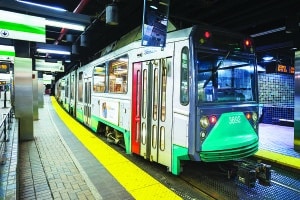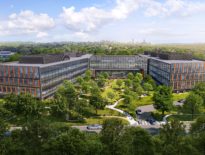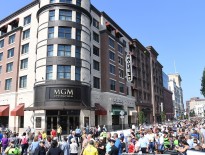Reducing the MBTA’s budget deficit next year and improving service will be possible thanks to new revenue from proposed fare increases, according to the authority. But one board member, aware of the pushback the hikes have drawn, wants the state to explore other ways of funding public transportation.
At the MBTA board meeting on Monday, Brian Lang said it would be “completely wrongheaded” to generate new money for the system just by leaning more on commuters. Instead, he suggested, officials should pursue some combination of a higher gas tax, additional fees on rideshare services and a congestion-pricing toll system.
“We don’t operate in isolation and we are never going to be able to have a world-class transportation system unless there’s some kind of coordination and unless our political leaders grow a little bit of courage when it comes to taking these issue on, because it does mean to tax, to have fees,” said Lang, a former meatpacker and bellman who serves as president of UNITE HERE Local 26, Boston’s hotel and food service union. “The money’s going to have to come from somewhere, and not just – I’m sorry, they’re not customers, they’re riders – from the people who are depending on riding every day.”
Lang told reporters after the meeting he did not know if those proposals should fully replace a fare hike, but he did have his eye on at least lessening the MBTA’s proposal. He requested a study on how the projected new revenue from higher fares would be affected if buses – which would increase from $1.70 to $1.80 per ride – as well as student and senior passes were kept level.
Officials say the fare hikes, which average 6.3 percent, would bring in an extra $32 million per year, on a budget that approaches $2.1 billion. They defend the push as necessary to pay for service upgrades and as a way to help achieve fiscal stability after a decade of upheaval.
Early projections use the proposed increases as a key way to improve the MBTA’s finances. The baseline deficit is forecast to double in fiscal year 2020, according to a presentation by Paul Brandley, the authority’s CFO.
However, through a combination of cost-cutting measures and fare increases, Brandley said that deficit could be cut from $74 million to $24.5 million, which would be about a third lower than fiscal year 2019. He expressed optimism about the authority’s long-term financial trends, noting that revenues are expected to grow at a higher rate than operating expenses.
“This is critical to holding the line and continuing on the path toward fiscal sustainability,” Brandley said.
Keeping revenue on an upward trend remains key. Own-source dollars, which come from advertising, parking and real estate, have increased about 60 percent since 2015, according to an earlier presentation Monday, and totaled $70 million in fiscal 2019.
However, the figure is still $30 million below the goal leaders wanted to hit by 2020, and that money is crucial for investments in the T’s infrastructure. By statute, the authority is supposed to rely more on non-fare revenue for service improvements.




 |
| 


